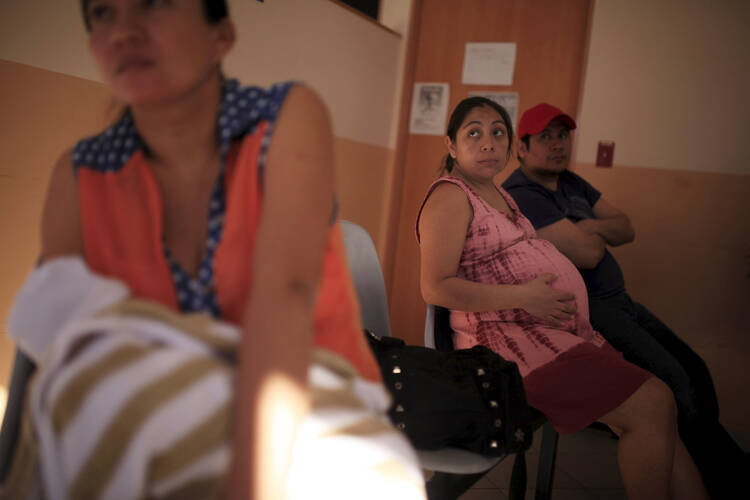Pope Francis’ response to a question about using contraception to avoid pregnancy because of concerns over the Zika virus, during a press conference on his return flight from Mexico, stirred some controversy. Though his comments did not change or cast doubt on Catholic teaching on contraception, they highlighted additional moral issues involved in the question and drew on the history of a case in which contraception was permitted, explaining that “avoiding pregnancy is not an absolute evil.”
To understand the pope’s moral reasoning, we need to follow the pattern of question and answer at the press conference. The reporter asked Pope Francis: “Holy Father, in the past weeks there’s been a lot of concern in many Latin American countries, and also in Europe, regarding the Zika virus. Pregnant women are the most at risk. Some authorities have proposed abortion, or else to avoid pregnancy. As regards avoiding pregnancy, on this issue, can the church take into consideration the concept of ‘the lesser of two evils’?”
Pope Francis answers first, that abortion “is not the lesser of two evils… It is a crime, an absolute evil.” But then he turns to “avoiding pregnancy” and introduces a case: “The great Paul VI, in a difficult situation in Africa, permitted nuns to use contraceptives in cases of rape [violenza]. Don’t confuse the evil of avoiding pregnancy by itself, with abortion.” The pope develops an extended argument on the wrongness of abortion, concluding, “each killing is condemned.” That is, abortion is never a legitimate moral option. But then he says, “avoiding pregnancy is not an absolute evil. In certain cases, as in this one, such as the one I mentioned of Blessed Paul VI, it was clear.”
While invoking the case of nuns using contraceptives in cases of possible rape as a reference for reflecting on contraception at a time of Zika, the pope not only rejects abortion as a legitimate option but concludes, by urging “doctors to do their utmost to find vaccines against these mosquitoes that carry this disease.”
What can we make of this exchange?
First, the pope, who has little time for deductive casuistry, does not respond to the questioner using the “principle of lesser evil.” Instead he takes the phrase “lesser evil” not as a principle but as a simple descriptive: abortion could never be considered a lesser evil because it is always an absolute evil; but “avoiding pregnancy is not.”
Instead of using that principle or another, like double effect, the pope invokes inductively a “permitted” case involving contraception even though the church has taught that contraception is morally wrong.
We should notice that Pope Francis is not changing the teaching on contraception: contraception remains morally wrong. But he is analogously invoking a permitted, exceptional case of contraception to answer the question regarding birth control and Zika. While there is no change in the teaching of “Humanae Vitae”on contraception, the pope is suggesting that the case of Zika is like the historical case permitted by Blessed Paul VI.
What is the case? From 1961 to 1964, several theologians raised the question whether an unmarried woman (especially a “consecrated woman”) could used birth control to protect herself from a pregnancy resulting from a rape. The case was a real one: religious women in the Congo were being raped at the time.
Though many major Roman theologians weighed in positively on the question (the discussion can be found in Ambrogio Valsecchi’s Controversy: The Birth Control Debate 1958-1968 Washington, D.C.: Corpus Books, 1967, 26-36; Edward Bayer, Rape within Marriage: A Moral Analysis Delayed Lanham: University Press of America, 1985, 82-92, 114-127), it was to my knowledge never resolved. There was, however, never any magisterial intervention, admonition or condemnation of the positive responses. For this reason, the position allowing contraception was considered tacitly permitted (Bayer, 115). Pope Francis states in fact that Blessed Paul VI “permitted” it.
Significantly the case was not simply that one religious woman could take the pill. It was that these women were given anovulant drugs by “doctors on the mission.” In other words, this was not a private action but a public and known health policy, involving Catholic doctors, in Catholic hospitals, providing contraception to Catholic women.
By invoking this public case and asserting that it was permitted by Blessed Paul VI, Pope Francis is reminding us that the question of contraception in areas under threat of the Zika virus, is not simply a matter of an individual woman’s decision. It is also a matter of the practices of Catholic health care facilities and their staff members struggling to protect the health needs of people under threat of the virus.
James F. Keenan, S.J., a moral theologian, is the Canisius Professor at Boston College.








